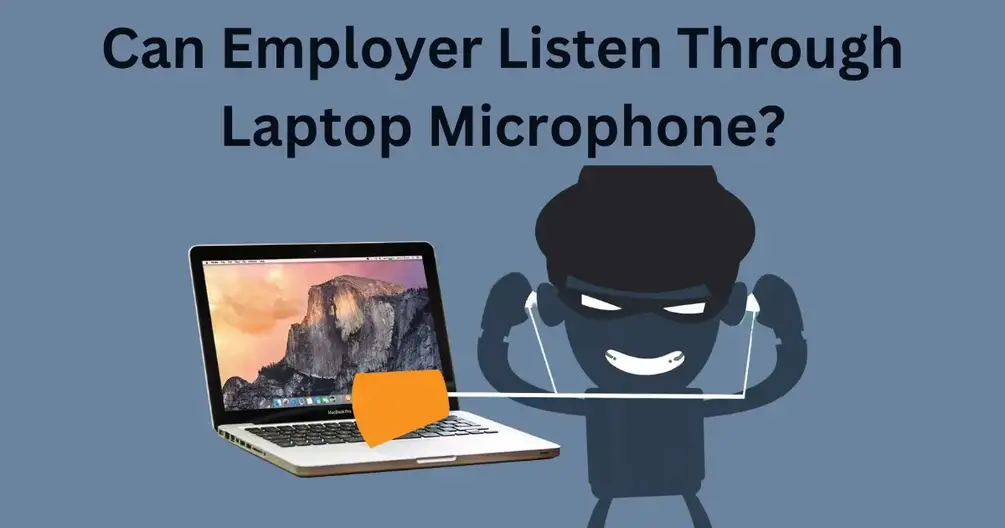In today’s digital age, where technology permeates every aspect of our lives, privacy concerns are becoming increasingly prevalent. One area of concern is the extent to which your employer can listen to you through your laptop.
With the advancement of monitoring software and the accessibility of audio data, it’s crucial to understand your rights and the extent to which your employer can monitor your computer.
In this blog, we will explore the various privacy concerns surrounding employer monitoring and the legal implications of such surveillance.
Let’s delve deeper into this topic to shed light on the question, can your employer listen to you through your laptop microphone?
Can your Employer Listen to you through your Laptop Microphone?

Yes, your employer has the potential to listen to your conversations through your laptop microphone. Some companies use monitoring software that not only records audio but also captures screenshots and tracks keystrokes. This means your boss could have access to more than just your spoken words, so it’s essential to be mindful of your online activities on company devices.
Does your Employer have to tell you if they are Monitoring your Computer?
No, federal law doesn’t make it mandatory for employers to inform you if they’re keeping an eye on your work computer. It’s a good idea to assume you’re being monitored, even if they haven’t specifically told you. Being cautious about sharing personal info while on the clock is a smart way to safeguard your privacy.
Can my Work Laptop be Monitored at Home?
Yes, your work laptop can potentially be monitored by your employer even when you are using it at home. Many companies install monitoring software on work devices to track employee activity and data.
This allows them to monitor things like web browsing history, documents accessed, emails sent, and more. The company owns the device and can claim they are monitoring it for security purposes or to protect company information.
However, this also means they could be watching your personal activities on the device as well outside of work hours. To avoid this, it’s best to keep personal use on your work laptop to a minimum and use a personal device for anything private.
Ultimately you should assume your work laptop is not 100% private, even in your home.
Can your Employer Listen to your Conversations?
In most cases, no, your employer cannot legally listen to your conversations without your knowledge or consent.
However, there are some exceptions. If you are using a work phone or device, your employer may be able to monitor conversations on those devices as they own the equipment.
Some jobs also utilize surveillance equipment like security cameras that could potentially record conversations. An employer may also listen in on phone calls if they have notified employees or it is stated in a work policy.
Overall, secretly listening to an employee’s private conversations would be difficult to justify ethically and legally in most cases. But you should be aware that any conversations made on work devices or property could have the potential to be monitored.
For truly private conversations, it’s best to use your personal phone and avoid the work equipment.
Is your Employer Legally Allowed to Listen through your Laptop?
Generally no, it is not legal for an employer to secretly listen through an employee’s personal laptop without consent. However, if the laptop is company-owned, the employer may have more rights to monitor it.
Overall, secretly activating a laptop’s microphone to eavesdrop on conversations would likely be illegal wiretapping in most cases. But employees should be aware that work devices can be monitored and limit personal use.
For private discussions, it’s safest to use personal devices not owned by your employer.
Conclusion
In conclusion, while it is technically possible for your employer to listen to you through your laptop microphone, it is important to consider the legal and ethical implications of such actions.
In most cases, employers are required to inform employees if they are monitoring their computer activity, including audio recordings.
However, there may be exceptions to this rule depending on the jurisdiction and specific circumstances. It is always a good idea to familiarize yourself with your company’s policies regarding privacy and technology usage.
If you have concerns about your privacy at work, it is best to consult with your HR department or seek legal advice. Remember, maintaining a healthy work-life balance and prioritizing your privacy is essential in today’s digital age.




![What Mic Does TimTheTatman Use? [+ Other Setup]](https://micgurus.com/wp-content/uploads/2022/02/What-Mic-Does-TimTheTatman-Use-Other-Setup-300x158.jpg 300w,https://micgurus.com/wp-content/uploads/2022/02/What-Mic-Does-TimTheTatman-Use-Other-Setup-1024x538.jpg 1024w,https://micgurus.com/wp-content/uploads/2022/02/What-Mic-Does-TimTheTatman-Use-Other-Setup-768x403.jpg 768w,https://micgurus.com/wp-content/uploads/2022/02/What-Mic-Does-TimTheTatman-Use-Other-Setup.jpg 1200w)